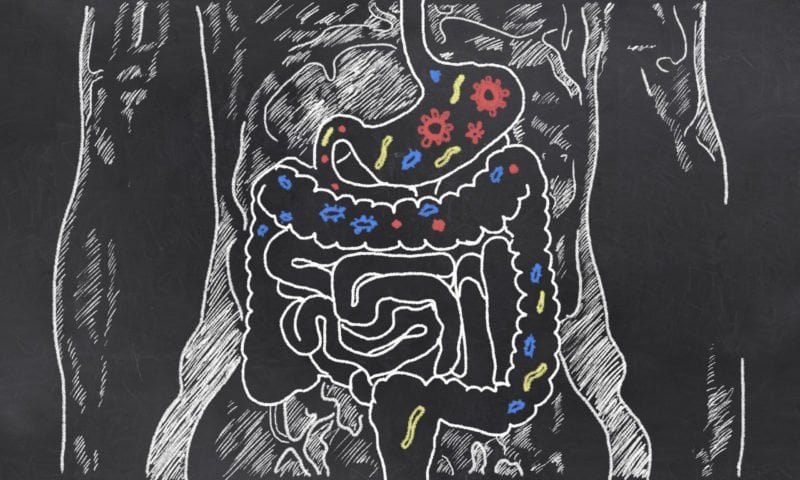How to Improve Digestion Naturally (as you age)

According to Merriam Webster, digestion is “the process of breaking down food by mechanical and enzymatic action in the alimentary canal into substances that can be used by the body.” In laymen’s terms, this simply means how your body turns the food you eat into nutrients to use for energy, growth, and cell repair.
Where Does Digestion Take Place?
Digestion takes place within the digestive system, which is comprised of several components. The main being the gastrointestinal tract (GI tract), which is a series of hollow organs joined in a long, twisting tube from the mouth to the anus. The entire tract consists of the mouth, esophagus, stomach, small intestine, large intestine, and anus. The liver, pancreas, and gallbladder are also vital organs in this system.
Every moving part in the process is crucial and has a very important role, which allows our bodies to break down the nutrients into parts small enough for the body to absorb and use them for energy, growth, and cell repair. For example, protein is broken down into amino acids; fats break down into fatty acids and glycerol; and carbohydrates break down into simple sugars.
Why is Healthy Digestion Important?
The majority of the foods we consume are not done so in a form that our bodies can use. Our digestive system must be in proper working order to facilitate this process. We rely on our digestive system to transform every single food and beverage that enters our mouths into a nutrient we can use, and eliminate what it cannot. Therefore, to optimize health and wellness, and limit overworking the digestive system, we must be mindful and consume foods that are mostly nutrient-dense and can provide us with the most bang for our buck, so to speak.
Not only is it critical to select the right foods and beverages, but eating slowly and chewing our food properly is just as important. Have you ever seen someone who looks as though they are inhaling their food and wonder if they even chewed or tasted it? I can almost guarantee they then experienced unfavorable symptoms following a meal and are looking at a rocky road ahead.
Now that we have covered the what, where, and why, let’s tackle the who and how.
The who is you and me. Together, let’s discuss how to improve digestion, which is especially important as we age.
I don’t know about you, but I see the light at the top of the hill and noticed a few things are becoming increasingly more difficult. If I can do anything to help make things run more smoothly as I begin to round out the top and begin my descent, especially if it increases my longevity, sign me up!
One of the first things I generally recommend is including a safe and effective probiotic in your diet, like BioTRUST Nutrition’s Pro-X10™. You see, building and maintaining a healthy gut flora, which involves optimizing the balance of “good” to “bad” bacteria, is critical to digestive system health and function, overall health, immune system function, mental health and wellbeing, metabolism and weight management, respiratory (i.e., lungs) and integumentary (i.e., skin) systems, and more.
When the gut flora is healthy and balanced, it supports digestive function, the immune system, metabolism, skin health, mental wellbeing, and more immensely.
However, research suggests that having inadequate levels of healthy bacteria in the gut may contribute to over 170 different health issues (including weight gain and difficulty with weight management), and a modern lifestyle characterized by stress, processed foods, sugar, artificial sweeteners, antibiotics, nutrient-depleted soil, and environmental toxins that can wreak havoc on the gut flora and disrupt the natural balance of healthy bacteria.
With that in mind, I truly believe everyone should be taking a probiotic daily to continually support optimal levels of probiotics, establish and maintain a healthy balance of bacteria in the gut, improve digestion, and support a robust immune system.
NOTE: I could also make a pretty strong argument for including Absorbmax™, Ageless Body®, OmegaKrill 5x™, and IC-5™ in the diet, each of which contain ingredients to assist with digestion. But I told you I wanted to discuss ways we can improve digestion naturally, so supplements aside, here are my top three things you can do—starting today—to improve your digestion. Naturally.
How to Improve Digestion Naturally: 3 Easy Steps
1. Hydrate
Water is the most essential nutrient, so much so that if we are deprived from consuming water for an extended period of time, we will die. The digestion process itself begins with saliva, which is made of water and enzymes, which help break down the food and beverages we consume before it continues through the digestive tract.
Aside from the fact that we use water in all of our cells, organs, and tissues, not to mention to help regulate our temperature and maintain other bodily functions, water is also necessary to help digest soluble fiber. Which leads me to the next item on my list…
2. 3F’s: Fiber, Fermentation, and Fats
With the help of water, fiber dissolves easily and benefits your bowel health by making well-formed, soft stools that are easy to pass. Fiber also acts as a cleansing agent to help clean out the bad bacteria and other buildup in your intestines, which may reduce your risk for colon cancer.
Foods that contain fiber also help to make you feel fuller, or more satiated, so that you can avoid overeating. Additionally, when you eat foods high in fiber, the sugar in those foods is absorbed slower, which keeps your blood glucose levels from rising too fast. Both of these things are great tools not only for health and wellness, but to aid in weight loss.
Peter piper picked a peck of pickled peppers. This Peter fellow may have been onto something. According to Torey Armul, a registered dietitian nutritionist and a spokesperson for the Academy of Nutrition and Dietetics, “Fermenting foods can change the nutritional content a little bit. It can increase the B vitamins in a food. That has been linked to bowel regularity, even improvements in blood pressure, blood sugar control. There’s a lot of things that happen when a food is fermented—the probiotics, the nutritional value of things, and (it’s) easier to break down—that can lead to benefits to your gut health.”
Think of it this way…fermented foods are chockful of “good” bacteria and enzymes, and they help break down the foods that may be a little more difficult, allowing your body to absorb the nutrients you intended to feed it. Fermented foods not only improve digestion but also benefit allergies and even weight loss.
Consuming adequate fatty acids round out my F-trifecta. Fat is often needed for proper nutrient absorption and may decrease your risk of developing inflammatory bowel diseases like ulcerative colitis. Not only that, but fat helps you feel satisfied after a meal, which helps promote weight loss. It’s a win-win.
3. Exercise
Most folks like to kick back, and maybe even unbutton their top button, after a meal. But settling into the couch, or even bed, after eating may be disrupting your digestion. You may think taking a walk prior to eating may work up an appetite, but perhaps taking a walk after you eat may help improve digestion and move things along, if you know what I mean. Gravity coupled with moderate exercise may help improve gut transit time.
Exercise also gets the blood flowing, which in turn helps move the food and beverage you consume through the digestive tract. Not only that, but exercise may reduce symptoms of inflammatory bowel diseases due to anti-inflammatory effects.
If you want to age gracefully, as I think we all do, improving your digestion is one of the biggest ways you can do so. These small changes to your regimen can make a huge impact and help heal your body from the inside out.







